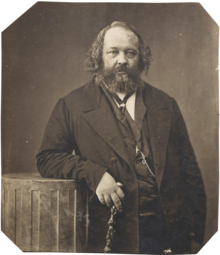Bakunin grew up in Pryamukhino, a family estate in Tver Governorate, where he moved to study philosophy and began to read the French encyclopédistes, leading to enthusiasm for the philosophy of Fichte. From Fichte, Bakunin went on to immerse himself in the works of Hegel, the most influential thinker among German intellectuals at the time. That led to his embrace of Hegelianism, bedazzled by Hegel's famous maxim, "Everything that exists is rational." In 1840, Bakunin traveled to St. Petersburg and Berlin with the intention of preparing himself for a professorship in philosophy or history at the University of Moscow. Bakunin then moved from Berlin, in 1842, to Dresden. Eventually he arrived in Paris, where he met Pierre-Joseph Proudhon and Karl Marx. Bakunin's increasing radicalism – including staunch opposition to imperialism in east and central Europe by Russia and other powers – changed his life, putting an end to hopes of a professorial career. He was eventually deported from France for speaking against Russia's oppression of Poland.
In 1849, Bakunin was apprehended in Dresden for his participation in the Czech rebellion of 1848, and turned over to Russia where he was imprisoned in the Peter-Paul Fortress in Saint Petersburg. He remained there until 1857, when he was exiled to a work camp in Siberia. Escaping to Japan, the US and finally ending up in London for a short time, he worked with Herzen on the journal Kolokol (The Bell). In 1863, he left to join the insurrection in Poland, but he failed to reach his destination and spent some time in Switzerland and Italy.

In 1868, Bakunin joined the socialist International Working Men's Association, a federation of trade unions and workers' organizations, which had sections in many European countries, as well as in Latin America and (after 1872) in North Africa and the Middle East. The "Bakuninist" or anarcho-socialist trend rapidly expanded in influence, and included the largest section of the International: Spain. A showdown loomed with Marx, who was a key figure in the General Council of the International. The 1872 Hague Congress was dominated by a struggle between Marx and his followers, who argued for the use of the state to bring about socialism, and the Bakunin/anarchist faction, which argued instead for the replacement of the state by federations of self-governing workplaces and communes. Bakunin could not attend the congress, as he could not reach the Netherlands. Bakunin's faction present at the conference lost, and Bakunin was (in Marx's view) expelled for supposedly maintaining a secret organisation within the international."
See more..
@Wikipedia
More Info..